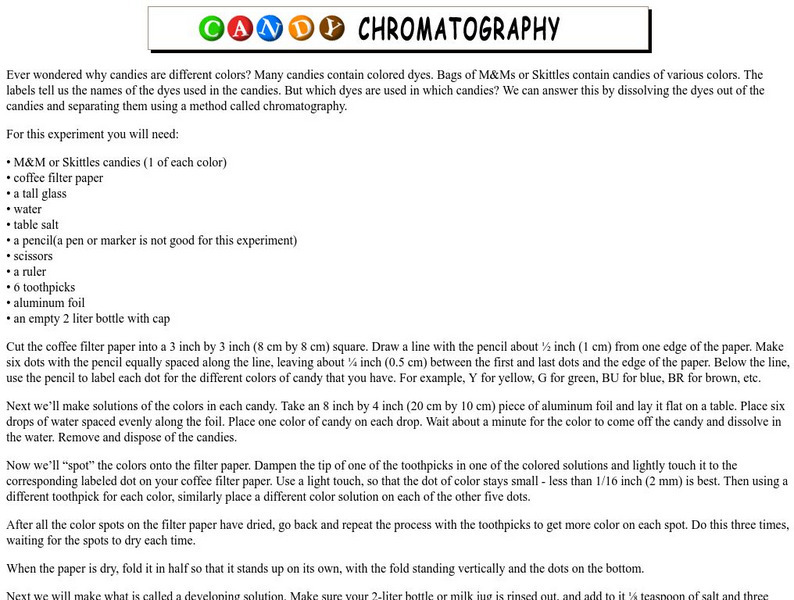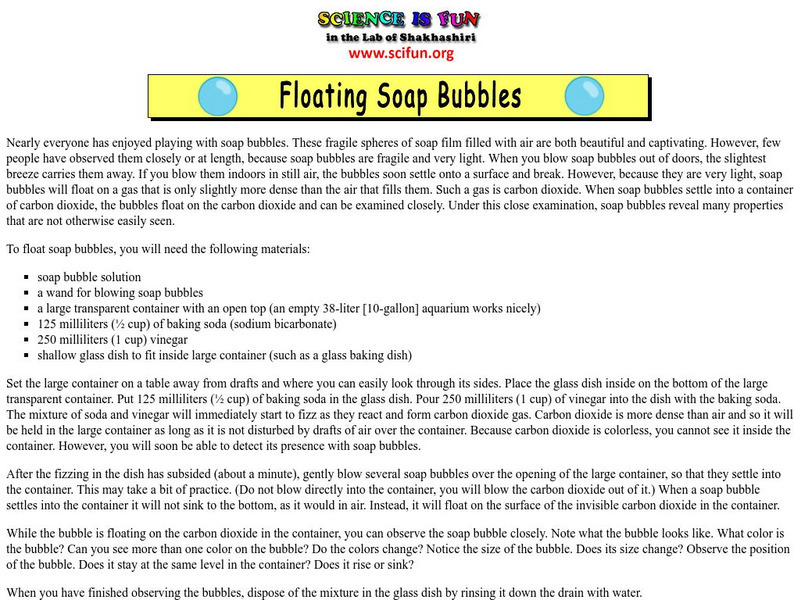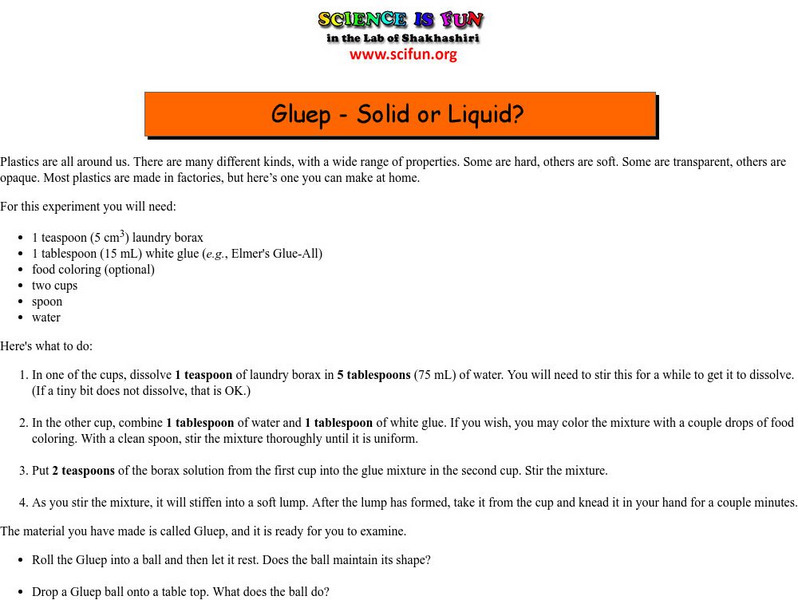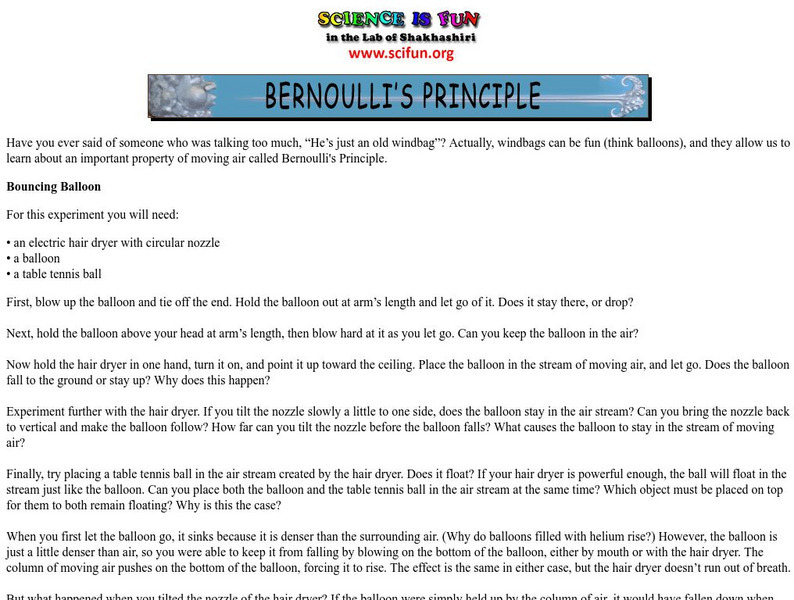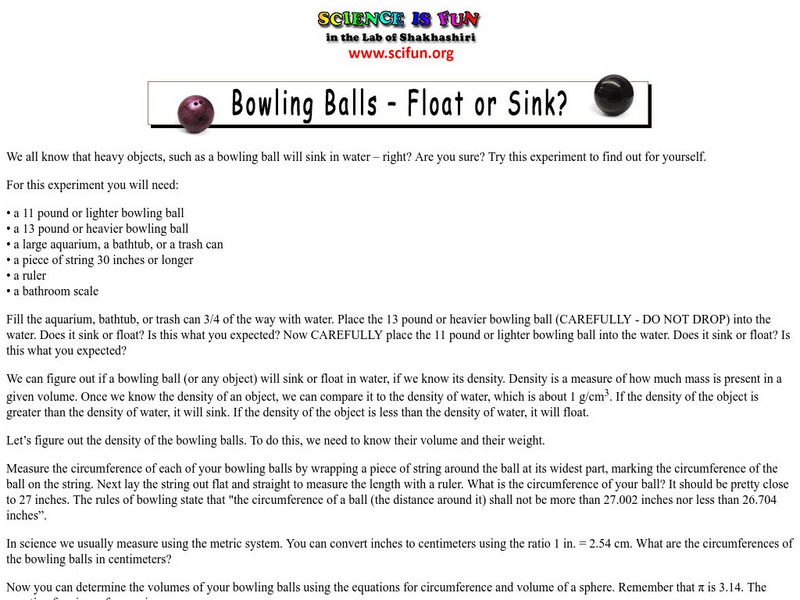Science Bob Pflugfelder
Science Bob: Clean Pennies With Vinegar
Science Bob presents instructions for a science demonstration of how to clean pennies with vinegar using common supplies with information on how it works.
Science Bob Pflugfelder
Science Bob: Roll a Can With Static Electricity
Science Bob presents instructions for a science demonstration on how to roll a can with static electricity using common supplies with information on how it works.
Science Bob Pflugfelder
Science Bob: Lemon Chemistry: An Acid Base Experiement
Science Bob presents instructions for conducting an acid-base experiment using common supplies with information on how it works.
Science Bob Pflugfelder
Science Bob: The Giant Dry Ice Bubble Sphere
Science Bob presents instructions for making a giant dry ice bubble sphere using common supplies.
Science Bob Pflugfelder
Science Bob: The Ultimate Bubble Solution
Science Bob presents instructions for making the ultimate bubble solution using common supplies with information on how it works.
Science is Fun
Science Is Fun: Candy Chromatography
In this experiment, you learn about chromatography when you separate the dyes in candies like M & M's and Skittles to see how many dyes are in each color.
PBS
Pbs Kids: Sci Girls
Girls share information about science projects they created, posting photos and descriptions about what they did and what they learned. Organized by science discipline.
Discovery Education
Discovery Education: Science of Everyday Life: Right Back at You! [Pdf]
What make a good reflective surface? In this lab, students will investigate different surfaces with a reflectivity tester. Lesson plan includes information for students and teachers.
Optical Society
Optical Society of America: Optics for Kids: Mirror, Mirror on the Wall
A simple experiment that clearly demonstrates angles of reflection when light hits a mirror. Accompanied by a good explanation of what's happening, and a link to an article on reflection.
Science is Fun
Science Is Fun: Floating Soap Bubbles
In this experiment you learn how to generate carbon dioxide inside a container, and float soap bubbles above the gas. Once the bubbles are suspended, it is possible to observe them closely, which is normally very difficult to do....
Science is Fun
Science Is Fun: Gluep Solid or Liquid?
In this experiment, students create a polymer substance called Gluep, then investigate its properties. Includes a detailed explanation of how the polymer molecules bond together to form the plastic.
Science is Fun
Science Is Fun: Chemiluminescence Cool Light
An experiment in chemiluminescent reactions using a commercial Lightstick. As the temperature conditions are changed, students observe changes in the Lightstick and record their observations.
Science is Fun
Science Is Fun: Layered Liquids
An investigation into what properties liquids have that enable them to sit in separate layers in a container.
Science is Fun
Science Is Fun: Build an Electric Motor
Instructions for how to build a simple electric motor.
Science is Fun
Science Is Fun: Bernoulli's Principle
An experiment with a balloon and a wind tube that investigate how Bernoulli's Principle applies to a stream of moving air.
Science is Fun
Science Is Fun: Rubber Bands and Heat
An experiment to investigate the thermal properties of rubber by studying its behavior in different scenarios. A discussion of how entropy explains what is observed is provided.
Science is Fun
Science Is Fun: Making Things Glow in the Dark
Try this experiment to learn how to make things glow under a black light, why this happens, and some applications of this phenomenon.
Science is Fun
Science Is Fun: Lumpy Liquids and Squishy Solids
An experiment in viscosity using cornstarch and water. Includes a detailed explanation of viscosity, of Newtonian and non-Newtonian fluids, and examples of different fluids that fit into each category.
Science is Fun
Science Is Fun: Bending Water
An experiment where static electricity is used to 'bend' a stream of water flowing from a faucet. Includes a detailed explanation of how this works.
Science is Fun
Science Is Fun: Conducting Solutions
An experiment where one must first build a conductivity tester, then use it to test how well water conducts electricity when different materials found around the home are each dissolved in it.
Science is Fun
Science Is Fun: Bowling Balls Float or Sink?
In this experiment, you test whether two different bowling balls will float or sink, then determine the density of each of the balls to see if they are less than that of water.
Science is Fun
Science Is Fun: Put a Shine on It
An experiment investigating how to remove the tarnish from silver. Includes an explanation of how the silver becomes tarnished, and the chemical reaction taking place when the shine is restored.
PBS
Pbs: Cooking With Bill Nye: Dependent and Independent Variables
Making dinner become a math challenge and science experiment with Bill Nye. This interactive exercise focuses on using what you know about dependent and independent variables to make a prediction about whether boiling water with the lid...
Bill Nye
Bill Nye: Listen to This!
You may have heard people say that your heart is a pump. You can tell a lot about how well your heart is working, just by listening with a stethoscope.



